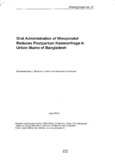Oral administration of misoprostol reduces postpartum Haemorrhage in urban slums of Bangladesh
Citation
Banu, M., Nahar, S., & Nasreen, H. E. (2013, April). Oral administration of misoprostol reduces postpartum Haemorrhage in urban slums of Bangladesh. Research Reports (2013): Health Studies, Vol - XLV, 223–258.Abstract
To avert deaths from postpartum haemorrhage (PPH), Manoshi initiated community
health workers (CHW) administered oral misoprostol (400~g) to women following
childbirth either at delivery centers or home in slums of Dhaka and under Gazipur City
Corporation in 2009. To study whether the supervised use of misoprostol would
reduce primary PPH following childbirth including its feasibility and community
acceptability. A non-randomized control trial was undertaken among 3,900 women in
urban slums of Dhaka and Gazipur City Corporation during January-August 2011 .
Oral misoprostol was prophylactically given to the treatment group following
childbirth, while the control group did not receive it. The misoprostol significantly
reduced incidence of primary PPH in the intervention group (4.5%) compared to the
control group (7.5%). The median blood loss of PPH cases was 868 ml in the
treatment and 928 ml in control group. It reduced the rate of bleeding-related
emergency transfer, additional medical interventions compared to control group.
However, no significant difference was found in blood transfusion between the two
groups. We found one-third of the women were aware about misoprostol in
intervention while none were aware in the control. The median risk for developing
PPH was lesser in the intervention and prolonged third stage of labour found
significantly higher in the control group. Misoprostol was found to be widely accepted
in the community and feasible to offer parturient by CHWs within 5 minutes following
childbirth in intervention group. Prophylactic use of misoprostol administered by
CHWs is feasible and effective in reducing the incidence of primary PPH in the
parturient of slums of Bangladesh. Besides, community-based education on
misoprostol and iron intake throughout pregnancy to reduce the need for blood
transfusion should be ensured.

